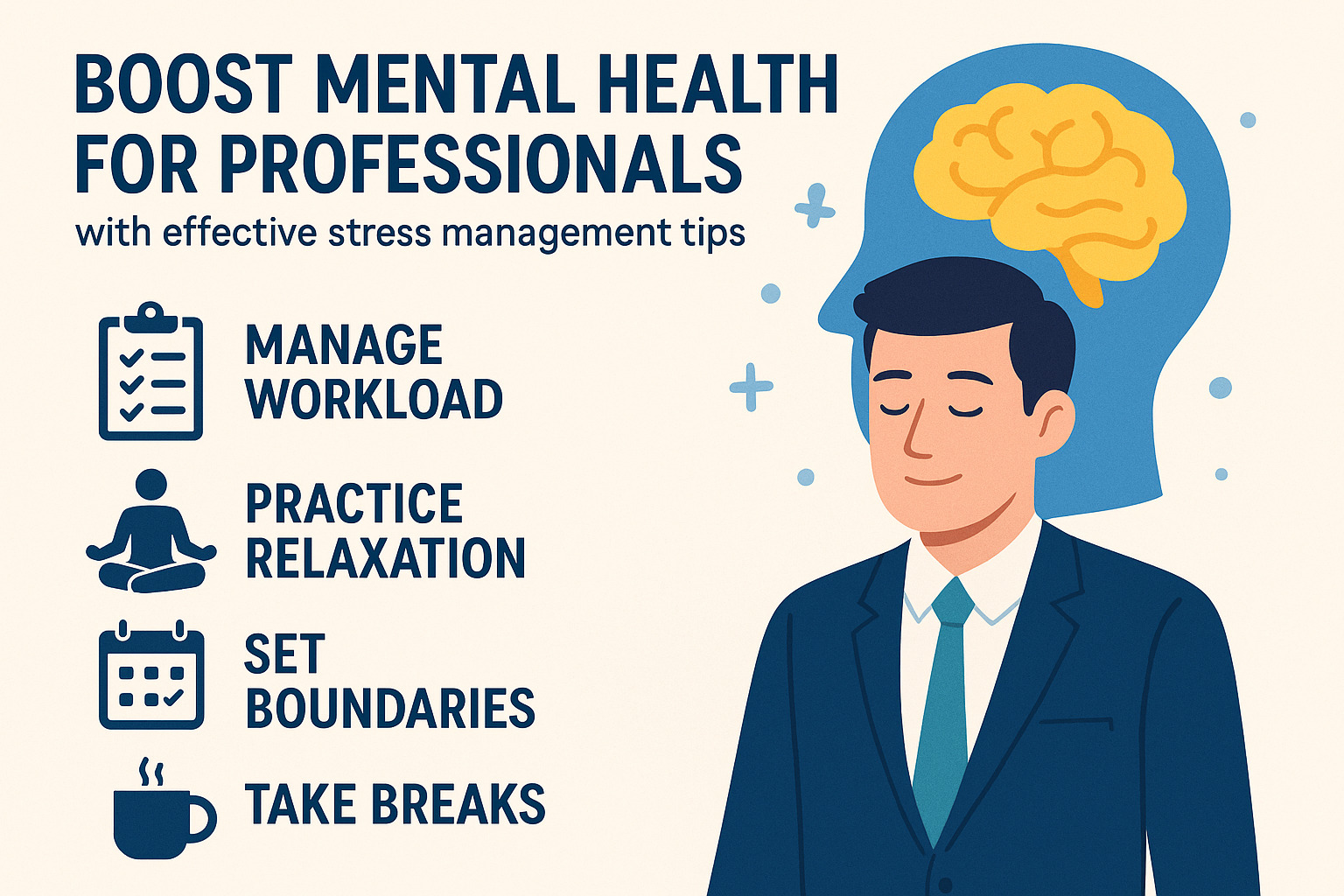Mental Health Tips for Professionals: Stress Management Strategies to Thrive in a Busy World
Introduction In today’s fast-paced professional environment, maintaining mental well-being often takes a back seat. However, neglecting mental health can have serious consequences, both personally and professionally. Mental health for professionals is a vital topic that deserves attention, and with effective stress management tips , you can lead a balanced, fulfilling life without compromising your productivity.
This blog explores actionable mental health tips tailored for busy professionals. From managing workplace stress to cultivating a supportive routine, this guide provides everything you need to start prioritizing your well-being.
Understanding the Importance of Mental Health for Professionals
What is Mental Health for Professionals? Mental health refers to emotional, psychological, and social well-being. For professionals, it affects how you handle work pressure, communicate with colleagues, and make decisions.
Why is Stress Management Critical for Busy Professionals? Work-related stress is a leading cause of burnout, reduced productivity, and health issues. Learning to manage stress effectively can improve focus, foster better relationships, and enhance overall performance.
Effective Stress Management Tips for Professionals
1. Prioritize Time Management
Juggling multiple responsibilities is a challenge. Effective time management can reduce stress and increase productivity.
- Use Tools: Leverage apps like Trello or Asana to organize your tasks.
- Set Boundaries: Define specific work hours and stick to them.
2. Practice Mindfulness and Meditation
Mindfulness encourages living in the present, reducing stress and improving focus.
- Begin your day with 10 minutes of meditation.
- Use guided meditation apps like Headspace for support.
3. Cultivate Healthy Work-Life Balance
Overworking often leads to burnout. Establish boundaries between your professional and personal life.
- Schedule regular breaks during work.
- Dedicate weekends or evenings to hobbies or family time.
4. Leverage Professional Support
Seeking help is a sign of strength, not weakness.
- Speak with a counselor if you’re feeling overwhelmed.
- Many companies offer Employee Assistance Programs (EAPs)—utilize them.
5. Regular Physical Activity
Physical health is closely linked to mental well-being.
- Exercise regularly, even if it’s a 20-minute walk.
- Consider yoga or pilates to ease tension and improve posture.
Building a Supportive Routine for Better Mental Health
Nutrition and Sleep
Busy professionals often sacrifice sleep and proper meals, but these are essential for mental health.
- Aim for 7-9 hours of quality sleep each night.
- Opt for balanced meals rich in whole grains, lean proteins, and vegetables.
Social Connections
Staying connected with friends and family offers emotional support.
- Plan social activities regularly.
- Join professional groups to expand your network.
Celebrate Small Wins
Acknowledging achievements, no matter how small, fosters positivity.
- Reflect on your accomplishments at the end of the day.
- Maintain a gratitude journal to cultivate a positive mindset.
Overcoming Common Challenges in Stress Management
However, managing stress isn't always straightforward. Professionals often face:
- Procrastination: Break tasks into smaller steps to make them manageable.
- Lack of Time: Set realistic goals and prioritize essential tasks.
- Feelings of Isolation: Reach out to colleagues or friends for support.
By addressing these obstacles, you can create a more sustainable approach to stress management.
Long-Term Benefits of Prioritizing Mental Health
Investing in your mental health leads to:
- Improved Focus: Clearer thinking and better decision-making.
- Higher Job Satisfaction: Feeling more engaged and motivated at work.
- Stronger Relationships: Healthier interactions with colleagues and loved ones.
Conclusion Taking care of mental health for professionals is not just a personal responsibility but also a step toward professional excellence. By incorporating these stress management tips , you can foster resilience, achieve better work-life balance, and lead a more fulfilling life.
Have your own tips or experiences to share? Let us know in the comments, and don’t forget to share this post with colleagues who could benefit from these insights!
Leave a comment
Your email address will not be published. Required fields are marked *




